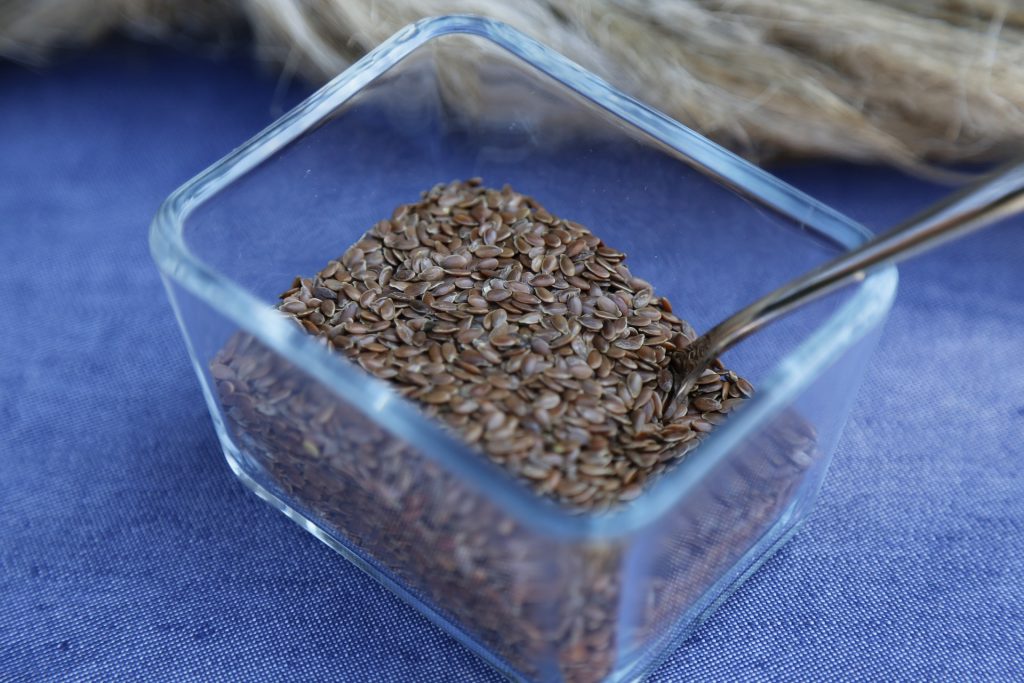 Alpha linolenic acid (ALA, C18:3 (n-3)) is a long chain fatty acid synthesised by plants. It is polyunsaturated fatty acid and contains three double bonds. Alpha linolenic acid is present in small amounts in most plants, and green leafy vegetables can provide a reasonably intake. However, flax and hemp seeds as well as walnuts are particularly rich sources. Alpha linolenic acid is an omega-3 fatty acid (it’s first double bond is 3 carbons from the methyl end of the molecule) and also happens to be an essential nutrient in human nutrition. Humans cannot synthesis ALA, but require it for the synthesis of longer more unsaturated fatty acids such as eicosapentaenoic acid (EPA, C20:5 (n-3)) and docosahexaenoic acid (DHA, C22:6 (n-3)). These fatty acids play a role in brain development and may have neuroprotective effects because they can confer anti-inflammatory effects on cells and tissues. Evidence suggests that in its role as a precursor to these compounds, ALA might have beneficial effects on mood and brain health.
Alpha linolenic acid (ALA, C18:3 (n-3)) is a long chain fatty acid synthesised by plants. It is polyunsaturated fatty acid and contains three double bonds. Alpha linolenic acid is present in small amounts in most plants, and green leafy vegetables can provide a reasonably intake. However, flax and hemp seeds as well as walnuts are particularly rich sources. Alpha linolenic acid is an omega-3 fatty acid (it’s first double bond is 3 carbons from the methyl end of the molecule) and also happens to be an essential nutrient in human nutrition. Humans cannot synthesis ALA, but require it for the synthesis of longer more unsaturated fatty acids such as eicosapentaenoic acid (EPA, C20:5 (n-3)) and docosahexaenoic acid (DHA, C22:6 (n-3)). These fatty acids play a role in brain development and may have neuroprotective effects because they can confer anti-inflammatory effects on cells and tissues. Evidence suggests that in its role as a precursor to these compounds, ALA might have beneficial effects on mood and brain health.

Walnuts are a good source of alpha linolenic acid. Walnuts also contain high amounts of antioxidant nutrients. Walnuts may therefore provide anti-inflammatory and antioxidant effects that could benefit brain health through a neuroprotective effect.
For example, it has been shown that ALA can protect the brain of animals from damage after a single treatment via injection. Further a lower and more physiologically relevant dose can also provide beneficial neuroprotective effects. In this regard ALA injected into the animals was able to increase the generation of new neurones and increase the expression of key proteins required for correct neuronal signalling. These effects were associated with increases in brain-derived neurotrophic factor (BDNF), a protein that has been shown to be required for neuronal growth, repair and regeneration. It is known that BDNF has antidepressant effects in animals and humans, and when administered ALA, mice shows significantly lower levels of depressive-like symptoms. Therefore ALA appears to have significant neuroprotective effects in animals, and this seems to translate into improvements in brain plasticity and mood. As well as animal models evidence also suggests that ALA is beneficial to mental health and mood of adult humans.

Other dietary sources of alpha linolenic acid include flax seeds (pictured) and hemp seeds. Green leafy vegetables also provide a source of dietary alpha linolenic acid.
It is known that the large increases in depression observed over the last century, coincide with reductions in the intakes of omega-3 fats. Biochemical assessments of blood also show that lower levels of omega-3 fatty acids correlate with increased risk of depression. Elevations in the ratio of arachidonic acid (AA, C20:4 (n-6)) to EPA appear to be predictive of depressive symptoms being present. This supports the contention that elevated levels of omega-6 fatty acids, in combination with depressed levels of omega-3 fatty acids are particularly important in producing an increase in the risk of depression. Supplemental EPA has been shown to be beneficial in treatment-resistant depression, unipolar disorder and women with borderline personality disorder. The genetic individuality for enzyme activities involved in metabolising long chain fats could explain the varying susceptibility to depression from different diets. That some antidepressant drugs also have anti-inflammatory effects might explain their benefits.
Eat Well, Stay Healthy, Protect Yourself
RdB
